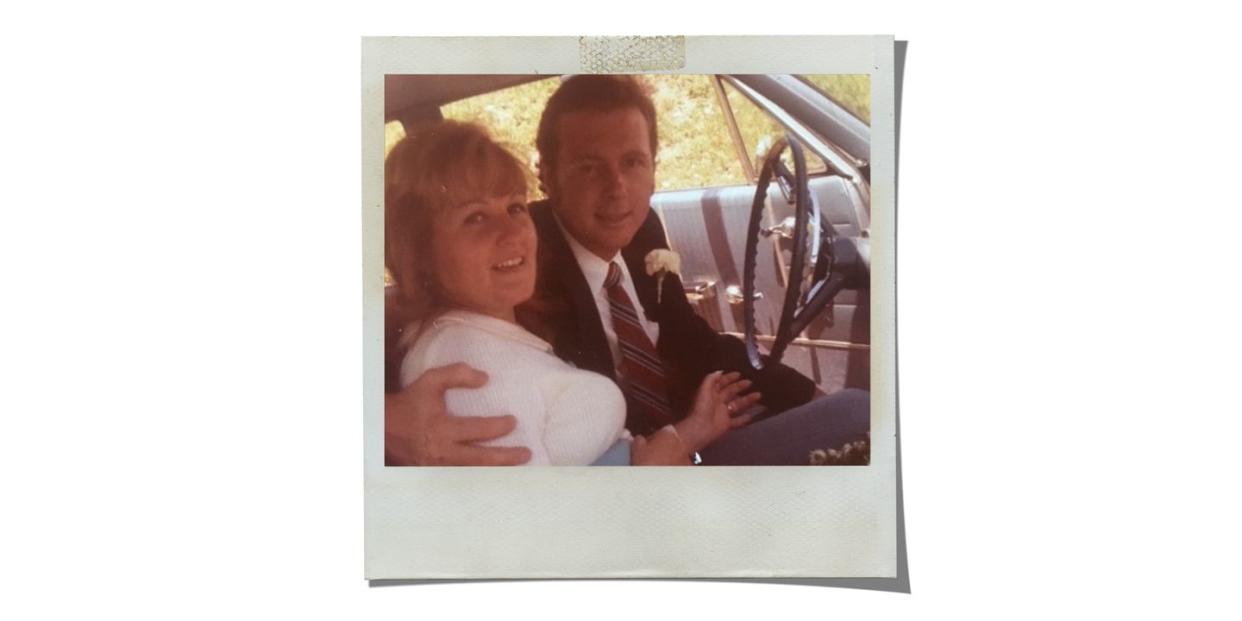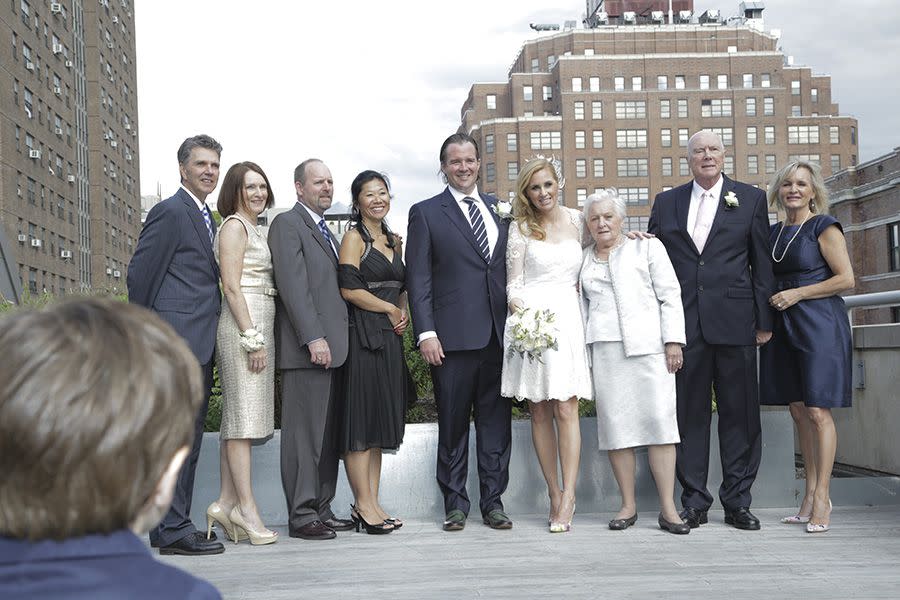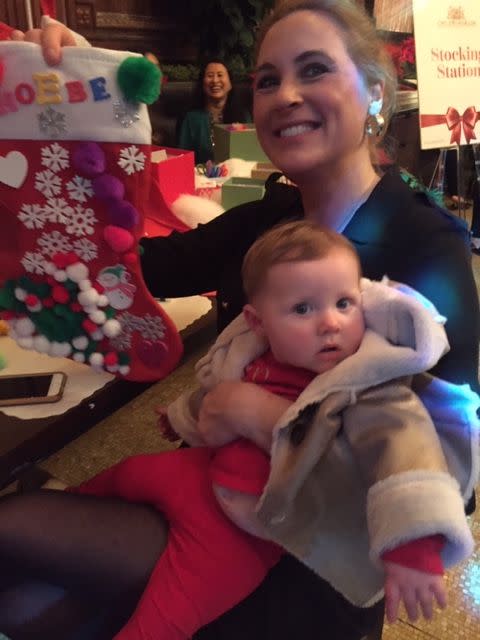My Mother Died Before My Baby Was Born, But My Daughter Will Still Know Her

About two hours after I gave birth to my daughter, I heard a familiar, loud voice in the recovery room, just outside the curtain where I sat with my new baby and my husband. Could it be the drugs? I thought as the voiced continued. Oh God, I realized, it's my father.
Turns out, he’d been circling the Manhattan hospital where I was delivering, doing loop after loop on foot waiting for word that his granddaughter had arrived. I wasn’t expecting him. In fact, I knew I would be recovering from a painful C-section, so I told him to give me a few days before visiting. What’s 48 hours?
Excruciating, if you ask him. "Let’s talk 'boundaries,'" I’d later half-joke.
When he did find me inside the maze of the hospital, he burst in and immediately took my daughter in his arms. “Your mother would have loved her,” he said, his eyes filling with tears. And in an instant, he sent me off on a flurry of thoughts about my own mom, who died on Christmas Eve in 2014.
That very night, in my hospital bed, I had a dream about my mother. She told me she loved the baby’s name, Phoebe. Maybe, again, it was the drugs. Either way, I found it oddly comforting. Now, four years later, I’ve only had more thoughts of her - and more questions about how to be a mom.

My daughter will never know my mom. She died after a long bout with dementia and a number of other mental and physical health issues. It was four months after my wedding; that was the last chapter she’d ever know of my life.
Becoming a mom, without a mom, I’ve found, is a singular, but not unique experience. Madonna’s been through it. Rosie O’Donnell, too, along with countless others. I know this because I’ve read everything I could get my hands on about parenting while missing a parent. There’s a void that just can’t be filled.

Trying to understand what I’m feeling is a start. There are so many layers of loss: When I see Phoebe hitting milestones, it makes me wonder about my own. Was I born with hair? When did I get my first tooth? When could I read? Did I love to dance? (Dads are great, but it’s generally moms - especially of that generation - who hold the answers to these questions.)
Then there’s the emotional hole where a grandmother should be. The babysitting, the extra love and affection, all the grandmotherly things a grandmother does. My mom would have done all if it.
There are the things I will change. The personal stuff, like saying “I love you” to Phoebe 1,000 times a day because I don’t think I heard it enough myself. Or not being so strict when it comes to discipling her for dumb teenage mistakes. I won’t keep secrets and I’ll encourage her to talk to me, nourishing her with things I lacked and needed.
But there will also be cherishing and recreating the things I did love about my mom, like how she treated everyone equally, or how she always brought a cake to someone’s house or tipped someone a little extra just because.
While it can be sad at times, it’s not all bad. Allison Gilbert, author of Parentless Parents: How the Loss of Our Mothers and Fathers Impacts the Way We Raise Our Children, tells me there are actually some positives to raising a child while missing a parent - or parents - of your own, as weird as that sounds. “I’ve found kids of moms or dads missing their own parents are far more compassionate people," she says. "They're much better friends to their friends, and they are much more eager to show up - and what I mean by that is, if my children’s friends have suffered a loss, they know how important it is to show up and be there."
Another unforeseen upside of going through this experience as a parent is that you have a very real, unique opportunity to model your own behavior when it comes to adversity. “If you’ve lost someone like a mom, that’s as bad as it generally gets," she says. "So, when there are other downs or traumas or missteps that everyone comes across, you can actually help them put into perspective what a catastrophe truly is."
But challenges do arise in ways that people could never understand if they’re not in your shoes. Gilbert reminds me that no matter how many amazing magazines or parenting books you read, they will never answer the very specific and personal questions you have about how you were when you were your daughter’s age.
Fortunately, there are antidotes to the complicated feelings that has come with this loss. One is to keep my mom an active presence in my daughter’s mind. I'll give Phoebe just enough age-appropriate information will keep her curious and keep the memory of my mom alive. “It’s 100% inevitable she’s going to ask about her, you may be surprised how it comes up," Gilbert tells me. "Never lie, but you don’t have to deliver the whole story all at once."

There are also healthy, fun ways to talk about her, things I find myself doing naturally anyway. One is active remembering, for instance proactively keeping my mom’s memory alive by saying Grandma “loves” pandas, rather than “loved” whenever we see an illustration of a panda in one of Phoebe's books.
Calling in what family you do have is key. You may be missing a mom or dad, but children do better when they are grounded in a bigger community. Luckily, my extended family is big. We’re looking forward to our annual Christmas Eve party, which is the date of my mom’s passing and also her favorite day. Multitudes of siblings, cousins, aunts, uncles, and old friends will gather to eat and drink and celebrate my daughter’s first Christmas - and tell stories about my mom. How bittersweet.
Marianne Garvey is a former reporter and television host turned freelance editor and writer who covers pop culture, news, relationships, Real Housewives, parenting, food, and all things celebrity. Her work has appeared in The New York Post, Good Housekeeping, Glamour, Dow Jones, E! News, and Bravo, among others. She lives in Manhattan with her husband, their daughter Phoebe, and their cats Tiki and Meepers. Follow her on Twitter or Instagram.
('You Might Also Like',)


